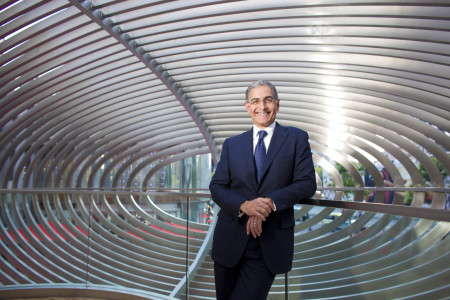Hyatt Hotels supports the Paulson Institute’s Mayors Training Initiative, which recently brought 22 Chinese mayors and urban officials to Chicago, Portland, and San Francisco for three weeks of intensive sustainability training. Hyatt CEO Mark Hoplamazian, who is also a member of the Institute’s CEO Council for Sustainable Urbanization, explains why Hyatt cares about helping China’s cities map a sustainable future.

Why is Hyatt supporting the Mayors Training Initiative, and why do you think it’s important?
We are in the business of caring for people so they can be their best, and that extends beyond the walls of our hotels and into our communities. Hyatt takes an active role in tackling global issues through the local contributions of our 100,000 passionate colleagues worldwide.
Our collaboration with the Paulson Institute is a natural fit. Hyatt opened its first hotel in Greater China 46 years ago. Now more than 25 Hyatt hotels operate throughout Greater China with even more growth underway. We understand how critical the success of China’s urbanization is for its continued economic and social development.
Working together, we will create more energy- and resource-efficient communities that thrive, and so we are thrilled to be a part of the collaborative approach that the Chinese Mayors Urban Sustainability Training Program takes to sharing sustainability practices and innovation.
The CEO Council is focusing this year on buildings, something Hyatt knows a lot about. What kind of opportunity do you see in China in terms of buildings and sustainability?
Hyatt is working closely with stakeholders and business partners to increase the focus on building more efficient, environmentally conscious hotels. We see opportunities to invest in technologies that reduce energy and water consumption such as building automation systems, heat recovery systems and efficient lighting.
We want to lead by example. All new construction and major renovation projects contracted for Hyatt-managed hotels are expected to follow enhanced sustainable design guidelines, and we have made a commitment to build all future full service hotels and resorts that Hyatt owns to LEED standards or an equivalent certification.
What is Hyatt doing to reduce your global carbon footprint, especially in China?
Our sustainability efforts – part of our Hyatt Thrive platform – are more than just the right thing to do; they help us run a better business. And our customers, colleagues and shareholders rightfully demand it.
Hyatt was one of the first companies in the industry to track our energy, water, C02 emissions, and waste output through a centralized database. We measure our progress relative to the ambitious goals we’ve set in our 2020 Sustainability Vision, like to reduce water use per guest night by 25 percent and for every hotel to reach a 40 percent diversion rate for recycling.
Here are two examples in China. Hyatt Regency Hangzhou installed energy-saving LED bulbs, and it manages energy use in areas like meeting rooms or entire floors when they are unused. This has reduced energy use per square meter by 19% since 2006. Also, the LEED-certified newly constructed Hyatt Regency Guiyang uses roof vegetation and vertical landscaping to reduce building heat alongside rainwater and recycled wastewater for landscaping and flushing toilets.
We’re proud to have colleagues worldwide engaged and leading everyday sustainability efforts, and we know this work will strengthen Hyatt’s collective ability to collaborate, inspire and further our commitment to environmental stewardship.


